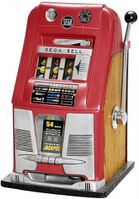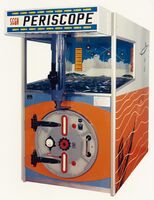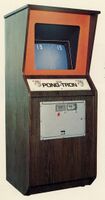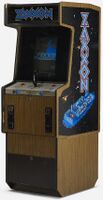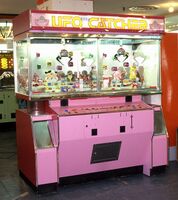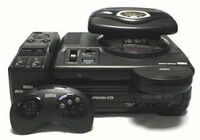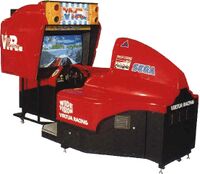Sega
From Sega Retro
- This page covers Sega as a business in broad, international terms. For the Japanese company, see Sega of Japan. For the American company, see Sega of America. For the European company, see Sega Europe.
Sega (セガ) is an international entertainment and media company currently headquartered in Shināgawa, Tokyo, Japan. With roots back to 1946, Sega experienced rapid growth through the latter half of the twentieth century to become one of the dominant forces in its field. It remains to this day a major player in the worldwide video game industry, covering arcade, console, handheld, mobile and PC markets.
The Sega brand is applied globally to several businesses, most of which are subsidiaries of Sega Sammy Holdings, established in 2004 by the merger of Sega Corporation and Sammy Corporation. In practice, most of these divisions and groups within the company are generally referred to and known collectively as "Sega".
Contents
History
- Main article: History of Sega.
Business interests
Amusement machines
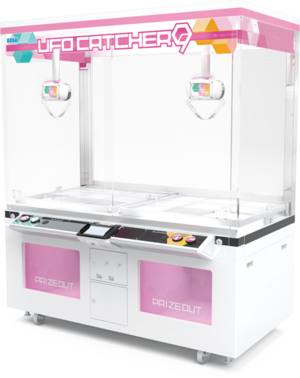
For most of its existence, Sega has been catering for the amusement industry, and alongside Namco and Taito, was seen as one of the major players in the Japanese market during the second half of the 20th century. While the sector has declined from its heights in the 1980s and early 1990s, Sega remains a prolific manufacturer of arcade machines, placing a specific emphasis on its home market of Japan.
The bulk of Sega's amusement machine business involves the creation of titles that are not easily replicated at home ranging from 1985 Hang-On to recent games like Maimai. For Japanese users, Sega has placed a high value on the use of the internet, allowing players to compete between arcade venues and keep track of their status through apps for mobile devices or physical cards.
Sega's heritage was built on gambling machines. As systems dealing with real money can be subject to heavy regulations, since the mid-1980s Sega has instead focused on "medal" games, often offering similar risk versus reward gameplay, but accepting and distributing currency specific to a venue, with no cash value outside of the premises.
While the arcade industry has declined significantly in Western markets since its peak in the 1980s, Sega continues operate amusement businesses in the US and Europe, distributing products by third-party manufacturers and maintaining (and refurbishing) the company's older back-catelogue of racing and shooting games. Popular releases such as Daytona USA and Sega Rally Championship, despite being more than two decades old, are still often seen in active service and are staples of what little remains of the arcade scene. Likewise, these branches continue to oversee the development of new releases targeting a Western audience.
In addition to creating arcade video games, Sega has ventured into other areas of the amusement business, from change machines to motion simulators. Since 1985 Sega has been producing UFO Catcher machines; popular "crane" games which have been a permanent fixture of Japanese game centres since the late 1980s. Sega have a significant stake in this market, for as well as constructing the cabinets themselves, the company also sources and distributes the prizes.
The company also produces "ride-on" machines for younger children, although few of these models have ever left Japan.
Video games
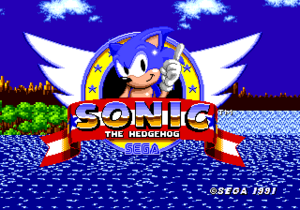
Sega has been directly involved in the home "consumer" video game market since 1983, doubling up in the first eighteen years as a hardware manufacturer. During this time the company has created a number of lucrative franchises which are still actively maintained to this day, most notably the Sonic the Hedgehog series whose eponymous lead character has become a mascot for the company.
Sega supports home video game consoles and handhelds from platform holders Nintendo, Sony and Microsoft. It emerged itself with the PC market with SegaSoft and Sega PC in the earlier years, but more recently supports it by Western subsidiaries like The Creative Assembly, Sports Interactive and Relic Entertainment. In 2000, Sega started it's mobile phone development with Sonic Cafe and that market became the companies primary focus in recent years. Titles such as Chain Chronicle and Puyo Puyo!! Quest are among the best performing titles.[3]
The company has a number of internal development studios based in Japan, with resources often shared between consumer and arcade projects. Local development in Sega of America and Sega Europe are also part of the operation. Unlike Sega of Japan, they exclusively work with external developers either by contract or owning the developer as a subsidiary.
With the purchasing of Index Holdings in the summer of 2013, Atlus now resides as part of the Sega-Sammy family and also share resouces with Sega's Japanese and American headquarters.
Currently popular Sega franchises are Sonic the Hedgehog, Phantasy Star Online, Yakuza (Ryu ga Gotoku), Hatsune Miku: Project DIVA and Puyo Puyo series.
Entertainment venues
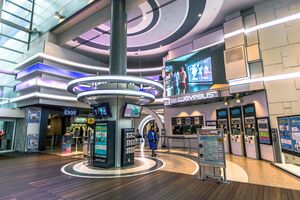
In addition to producing amusement machines, Sega is affiliated with a portfolio of properties in which consumers can access them. Sega opened the first of its many Japanese "game centers" in the late 1960s, likely peaking at 870 sites across Japan in 1999[4], including an array of Joypolis indoor amusement parts, Sega World and Club Sega amusement arcades, and a number of spa and leisure facilities.
In addition, Sega owned and operated Sega Republic in the UAE and a small number of venues in Taiwan and China. Cashflow problems, its merger with Sammy and subsequent restructuring in the mid-2000s led to Sega parting with many of its overseas entertainment venues, including the GameWorks chain in the US, Sega Worlds stationed in Australia and South Korea, and its numerous arcades spread across Europe, most notably SegaWorld London. Although the venues continue to operate under the Sega name for the foreseeable future, the majority of them are no longer directly managed by Sega themselves, with the buyouts of CA Sega Joypolis and Sega Entertainment in recent years.
The existence of dedicated venues has allowed Sega to create much larger projects over the years, including indoor rides and movie theaters. They have also proved convenient spots for location testing of arcade machines.
Consumer products
Throughout its history, Sega has occasionally ventured into the toy and consumer electronics markets. Of particular note is its takeover of Yonezawa Toys in 1994, leading to the creation of what would eventually become known as Sega Toys in 1998. As the largest post-War toy manufacturer in Japan, Yonezawa's incoporation into the Sega family meant that, for a time, Sega was a market leader in the Japanese toy market, with strong links to Hasbro in the United States. However, while Sega Toys continues to exist, it is currently managed as a separate entity within Sega Sammy Holdings.
Sega has also produced karaoke equipment (Prologue 21), a digital camera (Digio SJ-1), a television (Sega-Vision), PDAs (IR 7000 Communicator) and has published films on VHS cassette. It has created films and cartoon shows with partners such as TMS Entertainment, and its properties have been used to create books, albums, board games and audiobooks.
Sega's properties have also been turned into theater productions, with at one point bi-annual shows centred around Sakura Taisen and more recently, Phantasy Star Online 2: On Stage.
Notable products
Sega Bell (1957), rebranded High Top slot machines from Mills, and the first product to bear the "Sega" name.
Sega 1000 (1960), Sega's first home-grown product. Cheap jukeboxes negating the need for imports in Japan.
Periscope (1966), Sega's first successful electro-mechanical arcade machine.
Pong-Tron (1973), Sega's first "video" game.
Zaxxon (1982), a staple of US arcades in the early 1980s.
UFO Catcher (1985), the genesis of crane games in Japan.
The Sega Mega Drive (1988), pictured here with its many add-ons: the Sega Mega-CD, 32X, Mega Modem and Karaoke.
Virtua Racing (1992), milestone in the video game racing genre.
Print Club (1995), a phenomenon amongst Japanese teenagers in the late 1990s.
The Dreamcast (1998), Sega's online-enabled "super console", and an end of an era.
Key figures
- Irving Bromberg, Martin Bromley and James Humpert, founders of Service Games in 1946.
- David Rosen, founder of Rosen Enterprises and chairman of Sega until 1996.
- Hisashi Suzuki, Sega's earliest documented employee, from 1962 to 2014. He led Sega Production and Engineering Department during 1965-1984, developing electro-mechanical arcade games, before becoming Sega's head of R&D.
- Isao Okawa, president of CSK and later Sega, credited with saving Sega from bankruptcy in 2000 with $900 million USD of his own fortune.
- Hajime Satomi, current head of Sega-Sammy Holdings.
- Tom Kalinske, head of Sega of America between 1990 and 1996, credited with establishing Sega as a market leader in the US.
- Yu Suzuki, star developer of Sega AM2, responsible for numerous milestones in gaming history, from Space Harrier and OutRun to Virtua Racing, Virtua Fighter and Shenmue.
- Yuji Naka, Naoto Ohshima and Hirokazu Yasuhara, founding members of Sonic Team and collectively responsible for Sonic the Hedgehog and its immediate sequels.
- Toshihiro Nagoshi, notable creator of Daytona USA, Super Monkey Ball and the Yakuza series of games.
Gallery
External links
References
NEC Retro has more information related to Sega
|
| Sega, the company |
|---|
| Company profiles | Harmony | History | Jingle | Scream | Logo | Offices | Souzou wa Inochi | Wakai Chikara |
| Annual reports | Investor relations |
| Early Sega | |||||||||||||||||||||||||||||||||||||||
| 45 | 46 | 47 | 48 | 49 | 50 | 51 | 52 | 53 | 54 | 55 | 56 | 57 | 58 | 59 | 60 | 61 | 62 | 63 | 64 | 65 | 66 | 67 | 68 | 69 | 70 | 71 | 72 | 73 | 74 | 75 | 76 | 77 | 78 | 79 | 80 | 81 | 82 | 83 | 84 |
|---|---|---|---|---|---|---|---|---|---|---|---|---|---|---|---|---|---|---|---|---|---|---|---|---|---|---|---|---|---|---|---|---|---|---|---|---|---|---|---|
| Service Games | Gulf+Western | ||||||||||||||||||||||||||||||||||||||
| Service Games, Hawaii & Nevada & Japan | Nihon Goraku Bussan & Nihon Kikai Seizou | Sega Enterprises, Inc. | |||||||||||||||||||||||||||||||||||||
| Sega Enterprises, Ltd. | Sega Ltd. & Gremlin | Sega Ltd. | |||||||||||||||||||||||||||||||||||||
| Timeline of Sega of Japan research and development divisions |
|---|
|
83
84
85
86
87
88
89
90
91
92
93
94
95
96
97
98
99
00
01
02
03
04
05
06
07
08
09
10
11
12
13
14
15
16
17
18
19
20
21
22
|

